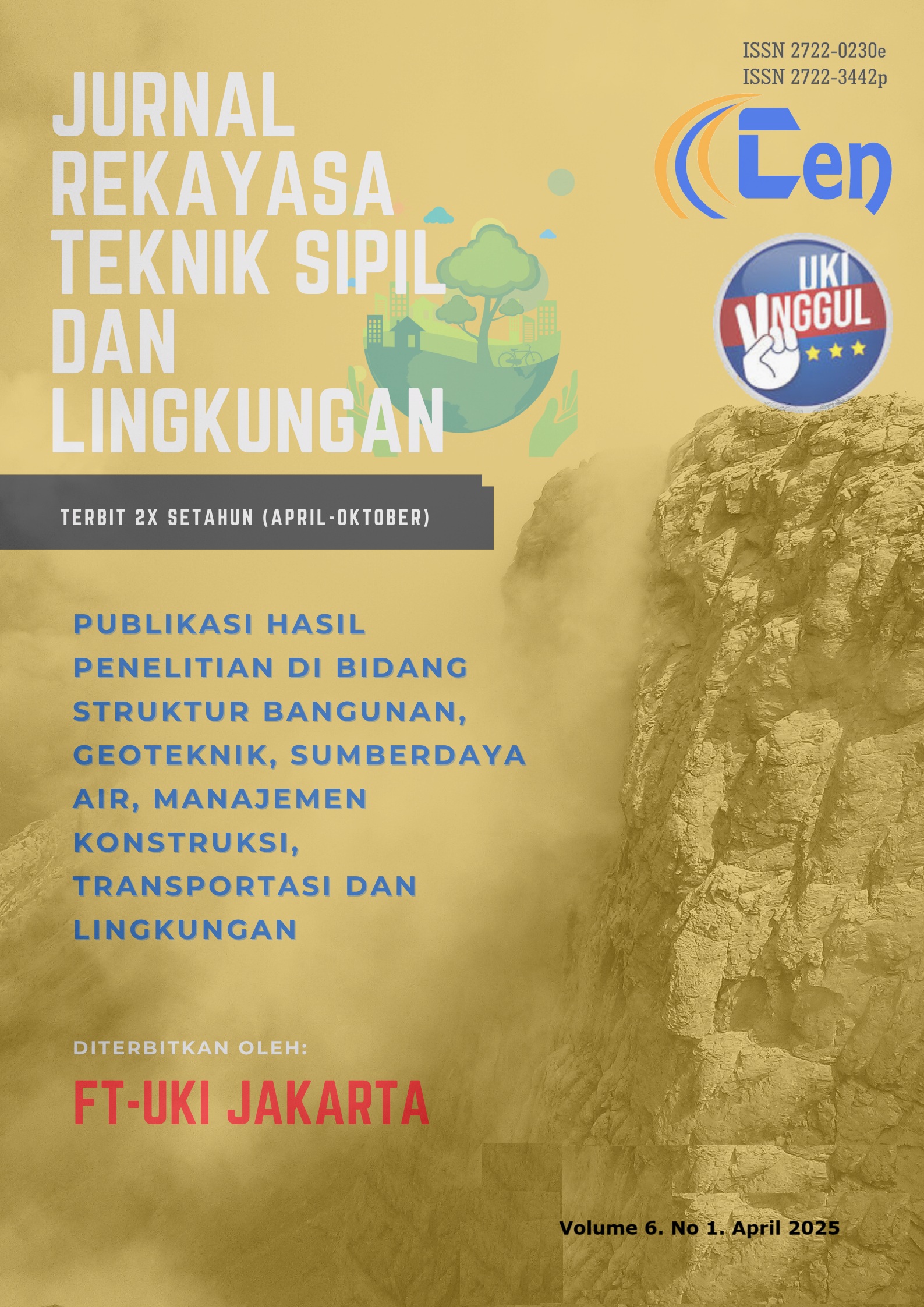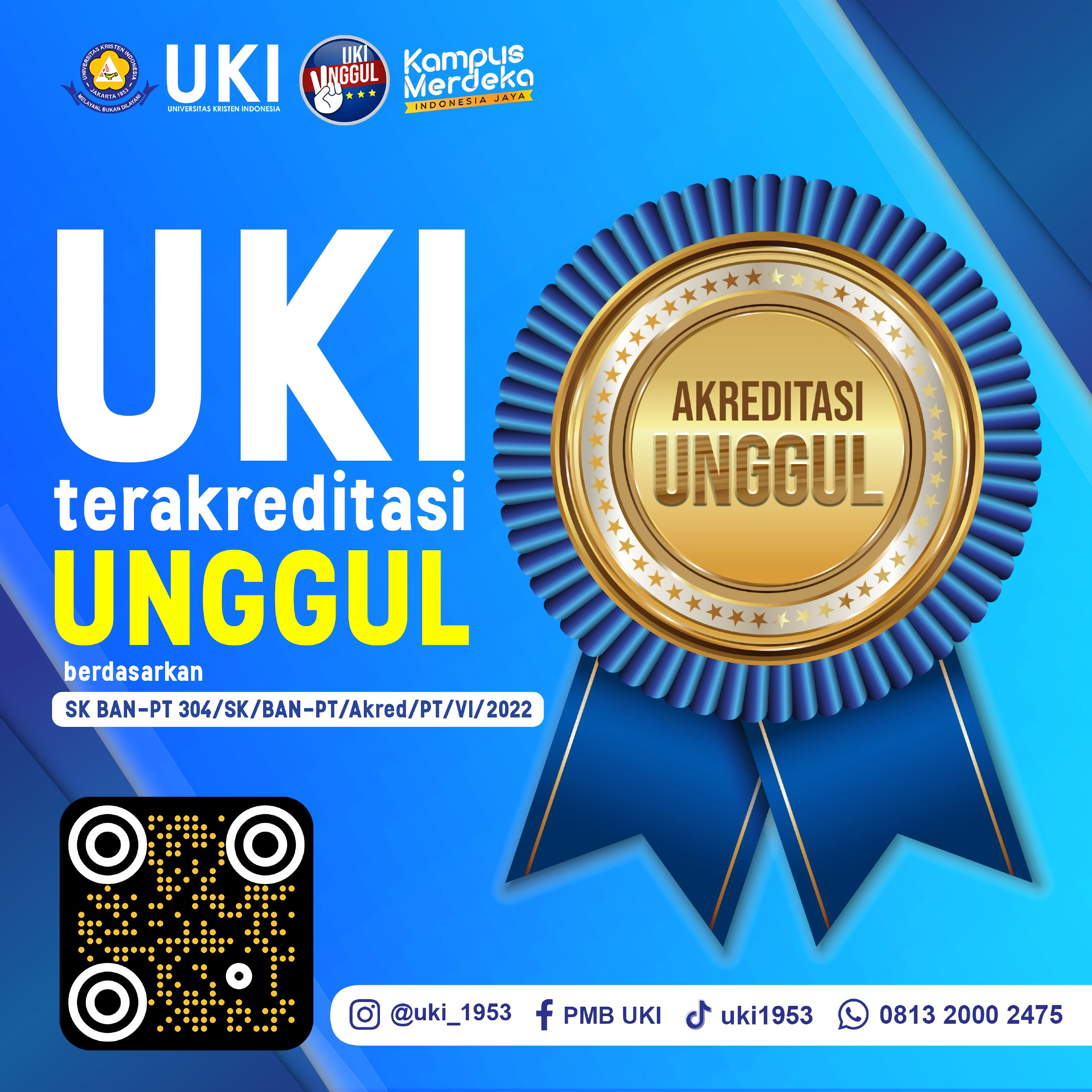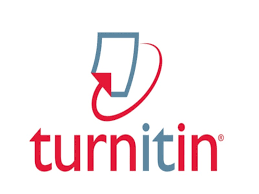OPTIMALISASI KONDUKTIVITAS TERMAL BETON BERPORI MELALUI INOVASI MATERIAL BERBASIS ABU SEKAM PADI DAN SERAT KELAPA SEBAGAI BAHAN TAMBAH RAMAH LINGKUNGAN
Indonesia
Keywords:
Coconut Fiber, Eco-Friendly Concrete, Pervious Concrete, Rice Husk Ash, Thermal ConductivityAbstract
The purpose of this study is to increase the thermal conductivity of pervious concrete by adding environmentally friendly supplemental materials, such as coconut fibre and rice husk ash (RHA). The material variations include RHA at 0%, 5%, 10%, and 15% by cement weight and coconut fiber at 0%, 0.5%, and 1% by total mix weight. Five selected combinations were analyzed based on the balance between workability, strength, and thermal performance. Tests conducted include slump (workability), compressive strength (at 28 days), thermal conductivity, water absorption, and freeze-thaw resistance. The results indicate that the addition of RHA and coconut fiber reduces workability but significantly enhances compressive strength and freeze-thaw durability. Thermal conductivity decreased by up to 23% in the mix with 15% RHA and 1% fiber, indicating improved thermal insulation capacity. While water absorption increased with higher fiber content, it was reduced by the presence of RHA. The optimal combination was found in the mix with 10% RHA and 1% coconut fiber, which offered the best balance between mechanical strength, thermal efficiency, and environmental durability.
Keywords: Coconut fiber; eco-friendly concrete; pervious concrete; rice husk ash; thermal conductivity
References
Analisis suhu ruang pemanfaatan serabut kelapa. (n.d.).
BukuStrukturBeton1. (n.d.).
Chen, L., Huang, L., Hua, J., Chen, Z., Wei, L., Osman, A. I., Fawzy, S., Rooney, D. W., Dong, L., & Yap, P.-S. (2023). Green construction for low-carbon cities: A review. Environmental Chemistry Letters, 21(3), 1627–1657. https://doi.org/10.1007/s10311-022-01544-4
Desimaliana, E., Shima, R. D., & Musyaffa, F. (2024). Analisis Biaya terhadap Pengaruh Penggunaan Limbah Marmer dan Abu Sekam Padi pada Beton Geopolimer. Journal of Sustainable Construction, 3(2), 45–53. https://doi.org/10.26593/josc.v3i2.7905
Fahruddin, A. (n.d.). Buku Ajar Perpindahan Panasheat sink dan permukaan bersirip.
High Strenght Concrete. (n.d.).
Laia, Y., Hutabarat, L. E., & Tampubolon, S. P. (2023). Compressive strength characteristic of fly ash light concrete mixture using artificial light weight aggregate (ALWA). AIP Conference Proceedings, 2689, 040006. https://doi.org/10.1063/5.0114932
Lubis, N. A., & Putri, M. D. (2024). Teknologi Nano Dari Bahan Alam Sebagai Prospek Penerapan Konstruksi Berkelanjutan. International Journal of Science, Technology and Applications, 2(2), 102–119. https://doi.org/10.70115/ijsta.v2i2.232
Mawardi, I., Rizal, S., Aprilia, S., & Faisal, M. (n.d.). Kajian stabilitas termal bahan baku material insulasi panas berbasis serat alam: Kayu kelapa sawit dan serat rami.
Politeknik Negeri Jakarta, Nisa, M. A., Sitanggang, A. N., & Universitas Esa Unggul. (2025). Literature Study on the Potential of Rice Husk Ash as a Local Pozzolanic Material in Concrete. Journal of Civil Engineering and Planning, 6(1), 115–124. https://doi.org/10.37253/jcep.v6i1.10399.
Rommel, E., Rusdianto, Y., Utari, R. P., & Riyanto, A. S. (2017). Pengaruh Pemakaian Fly-Ash Terhadap Karakteristik Beton Busa (Tinjauan Pada Konduktivitas Termal Dan Sound Absorption Beton).
Setiawan, F. (2022). Pengaruh Variasi waktu Proses Hot Dipping Alumunizing Coating Stainless Steel 304 Terhadap Karakteristik Material dan Konduktivitas Termal.
Simanjuntak, I. V., & Tampubolon, S. P. (2022). Pengaruh Variasi Agregat Kasar Penyusun Beton Porous Terhadap Kuat Tekan dan Porositas Beton. Jurnal Rekayasa Teknik Sipil dan Lingkungan - CENTECH, 3(1), 1–10. https://doi.org/10.33541/cen.v3i1.3966
Siregar, R. A., Hutabarat, L. E., Tampubolont, S. P., & Purnomo, C. C. (2021). Optimizing Empty Fruit Bunch (EFB) of palm and glass powder as a partial substitution material of fine aggregate to increase compressive and tensile strength of normal concrete. IOP Conference Series: Earth and Environmental Science, 878(1), 012047. https://doi.org/10.1088/1755-1315/878/1/012047
Sulfianty, S., Nurhayati, N., & Subaer, S. (2020). Studi Tentang Konduktivitas dan Resistansi Termal Geopolimer Berpori Berbasis Abu Terbang (Fly Ash). Jurnal Sains dan Pendidikan Fisika, 16(2), 161. https://doi.org/10.35580/jspf.v16i2.15983
Tajalla, G. U. N., Andriansyah, P., Riyadi, I. T., Vadila, M. L. N., & Laksono, A. D. (2024). Karakteristik Termal Material Komposit Berbahan Dasar Polipropilena dan Batang Pisang. Jurnal Teknik: Media Pengembangan Ilmu dan Aplikasi Teknik, 23(1), 41–49. https://doi.org/10.55893/jt.vol23no1.554
Tampubolon, S. P., Lase, F. J., Sudarwani, M. M., Sari, D., Nataldo, B. T., & David, C. (2024). Pengembangan Usaha Mandiri Masyarakat Desa Srimahi Kecamatan Tambun Utara Dengan Pemanfaatan Limbah Sekam Padi Sebagai Campuran Beton Paving Block Dan Batako. Jurnal Abdi Insani, 11(4), 2507–2516. https://doi.org/10.29303/abdiinsani.v11i4.2150
Tang, S., Wang, Y., Geng, Z., Xu, X., Yu, W., A, H., & Chen, J. (2021). Structure, Fractality, Mechanics and Durability of Calcium Silicate Hydrates. Fractal and Fractional, 5(2), 47. https://doi.org/10.3390/fractalfract5020047
Zalukhu, P. S., Irwan, I., & Hutauruk, D. M. (2017). Pengaruh Penambahan Serat Sabut Kelapa (Cocofiber) terhadap Campuran Beton sebagai Peredam Suara. JOURNAL OF CIVIL ENGINEERING, BUILDING AND TRANSPORTATION, 1(1), 27. https://doi.org/10.31289/jcebt.v1i1.367
Downloads
Published
How to Cite
Issue
Section
License
Copyright (c) 2025 Irene Vista Simanjuntak, Sudarno P Tampubolon, Pinondang Simanjuntak

This work is licensed under a Creative Commons Attribution 4.0 International License.
Hak Cipta atas Tulisan Karya Ilmiah
Bersama dengan ini saya sebagai penulis utama menyatakan bahwa paper yang saya kirimkan untuk dipublikasikan melalu Jurnal Rekayasa Teknik Sipil dan Lingkungan adalah benar merupakan hasil orisinil Tulisan Karya Ilmiah yang merupakan hasil penelitian/kajian yang saya lakukan dan belum pernah dipublikasikan pada penerbit Jurnal ilmiah lain di Indonesia.
Jika di kemudian hari ternyata ditemukan bukti adanya hal-hal yang tidak sesuai dari pernyataan diatas maka saya bersedia menerima konsekuensi yang diberikan oleh Dewan Redaksi Jurnal Rekayasa Teknik Sipil dan Lingkungan serta paper yang telah diterbitkan akan DIBATALKAN dan dinyatakan sebagai hasil karya PLAGIASI.









